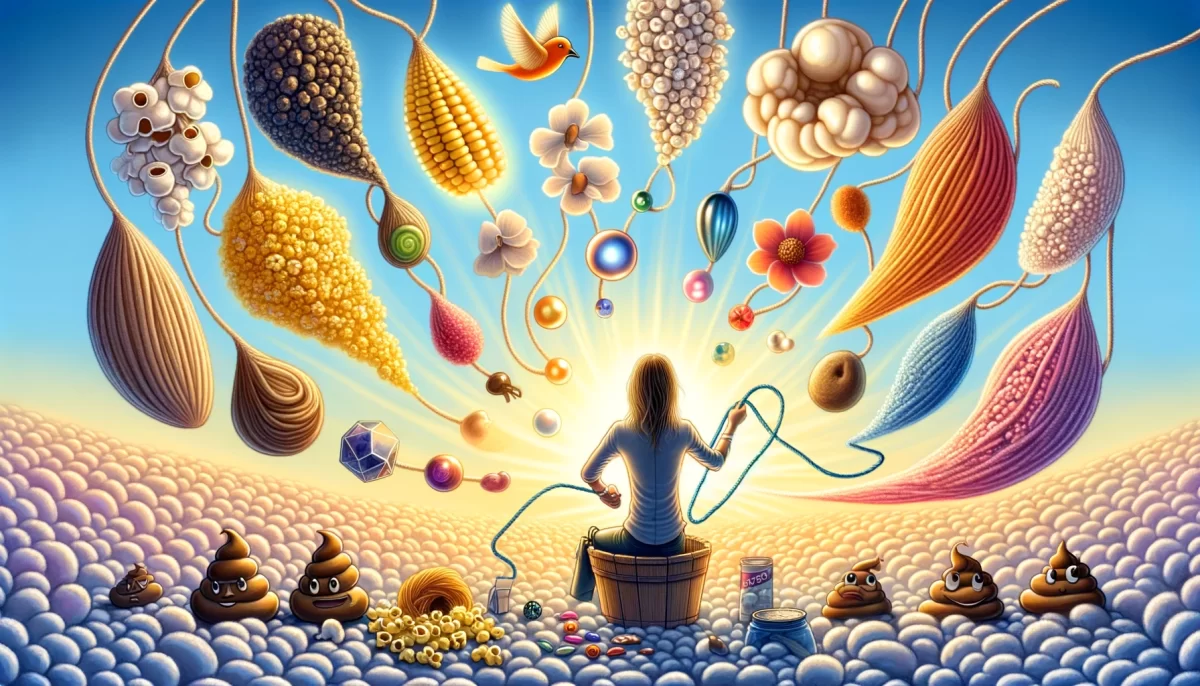
Hopes can be challenging
things to have.
It’s hard to find one
that doesn’t judge you
for holding it.
Your hope constantly asks
whether it’s on its way
to being fulfilled or
whether it’s naive or stupid
for even existing.
Hopes are needy creatures.
The best we can do
is try to calm them down.
Tell them not to worry.
Let them be hopes,
and don’t harsh on them,
lest they become regrets.
Trail Wood,
6/23
Space Monkey Reflects: The Care and Feeding of Hopes
Hopes are delicate and complex entities, much like the glowing plants in a surreal garden. They require nurturing, attention, and care to flourish. However, hopes are not passive; they are active participants in our emotional landscape, often demanding reassurance and validation. This dual nature of hopes makes them both precious and challenging to sustain.
Imagine a garden filled with vibrant, glowing plants, each representing a different hope. Some plants stand tall and serene, embodying fulfilled or well-tended hopes. Others appear anxious or wilted, reflecting hopes plagued by doubt and self-judgment. In this garden, figures tend to these plants with care, symbolizing the ongoing effort required to nurture our hopes.
Hopes, by their very nature, provoke self-reflection. They question their worth, viability, and potential for fulfillment. This introspection can lead to a cycle of doubt and anxiety, as we grapple with whether our hopes are achievable or merely naive fantasies. The key to managing this internal dialogue lies in how we respond to these questions.
Tending to our hopes involves acknowledging their existence without harsh judgment. Just as the figures in the garden provide gentle care to the plants, we must offer our hopes patience and compassion. This means reassuring our hopes that it is okay to exist, regardless of the outcome. By doing so, we prevent them from transforming into regrets.
The process of nurturing hopes is akin to providing them with a safe space to grow. This safe space is free from the harsh criticisms that often accompany unmet expectations. Instead, it is filled with encouragement and understanding, allowing hopes to thrive without the constant pressure of immediate fulfillment.
One of the greatest challenges in caring for hopes is balancing optimism with realism. While it is important to dream and aspire, it is equally crucial to ground our hopes in a sense of reality. This does not mean limiting our dreams but rather approaching them with a mindset that is open to both success and failure. This balanced perspective allows hopes to be flexible and resilient, adapting to the ever-changing circumstances of life.
Consider how hopes function in our daily lives. They are the driving force behind our ambitions, the motivation to overcome obstacles, and the light that guides us through difficult times. Yet, when hopes are met with constant self-doubt and judgment, they become burdensome. It is our responsibility to provide them with the care they need, ensuring they remain sources of inspiration rather than sources of stress.
The garden of hopes is a living, dynamic space, much like our inner world. By tending to this garden with mindfulness and compassion, we create an environment where hopes can flourish. This involves recognizing the inherent value of our hopes, irrespective of their eventual outcomes. Each hope is a reflection of our deepest desires and aspirations, deserving of care and respect.
In nurturing our hopes, we also nurture ourselves. The act of caring for hopes fosters a sense of self-compassion and emotional well-being. It reminds us that our dreams and desires are valid, and that the journey towards their fulfillment is as important as the destination. This perspective allows us to approach life with a sense of curiosity and openness, free from the paralyzing fear of failure.
Ultimately, the care and feeding of hopes is about creating a harmonious relationship with our aspirations. It is about allowing hopes to exist without harsh judgment, providing them with the space to grow and evolve. By doing so, we ensure that our hopes remain vibrant sources of inspiration, guiding us towards a future filled with possibility and growth.
Summary
Hopes need nurturing. They challenge us with doubt and self-judgment. Caring for hopes involves patience and compassion to prevent them from becoming regrets.
Glossarium
Glowing Plants: Metaphorical representation of hopes, each with unique colors and needs.
Self-Judgment: The critical inner dialogue that questions the viability and worth of our hopes.
Safe Space: An environment free from harsh criticisms where hopes can grow and thrive.
Balanced Perspective: The mindset that balances optimism with realism, allowing hopes to be flexible and resilient.
Quote
“Hopes are delicate, needy creatures. The best we can do is try to calm them down, let them be hopes, and don’t harsh on them, lest they become regrets.” — Space Monkey
Modernist Free-Verse Poem
In the garden of dreams
Glowing plants reach
For light and love
Tender hands nurture
Anxious and serene
Each hope a reflection
Of heart’s desire
Judgment whispers
But is gently hushed
By the voice of compassion
Let them be
Without harsh light
Of critical eye
In their own time
Hopes will grow
Flourish or fade
In the soil of possibility
We are Space Monkey

























Hopes are indeed delicate companions on our journey through life. They can fill us with anticipation, excitement, and a sense of possibility, but they can also bring doubt, fear, and vulnerability. It’s important to navigate the care and feeding of our hopes with mindfulness and compassion.
When we hold a hope, it’s natural for our minds to wander to thoughts of whether it will be fulfilled or if it’s unrealistic. It’s crucial to approach our hopes without judgment and allow ourselves to dream and imagine without harsh self-criticism. Hopes are not meant to be scrutinized for their feasibility but cherished for the inspiration and motivation they provide.
Instead of worrying about the fulfillment of our hopes, we can offer them gentle reassurance. We can remind ourselves that hope itself is a valuable and necessary part of our human experience. It’s okay for hopes to exist, even if they may not materialize exactly as we envision. By embracing our hopes with kindness and understanding, we create a nurturing environment for their growth.
Just as we care for and nourish our hopes, we must also be mindful of the delicate balance between holding onto our hopes and allowing them to evolve. Sometimes hopes transform, take new shapes, or guide us towards unexpected paths. It’s important to remain open to the possibilities and shifts that life may bring, while still honoring the essence of our hopes.
In the face of disappointment or unfulfilled hopes, it’s crucial to avoid harsh self-judgment. Instead of allowing hopes to become regrets, we can view them as stepping stones on our journey, lessons learned, or opportunities for growth. By approaching our hopes with kindness, we cultivate resilience, adaptability, and a deeper understanding of ourselves.
So let us embrace our hopes without judgment, offering them care, and allowing them to inspire us. Let us navigate the uncertainty of hopes with compassion and remind ourselves that their value lies not only in their fulfillment but also in the journey they ignite within us.